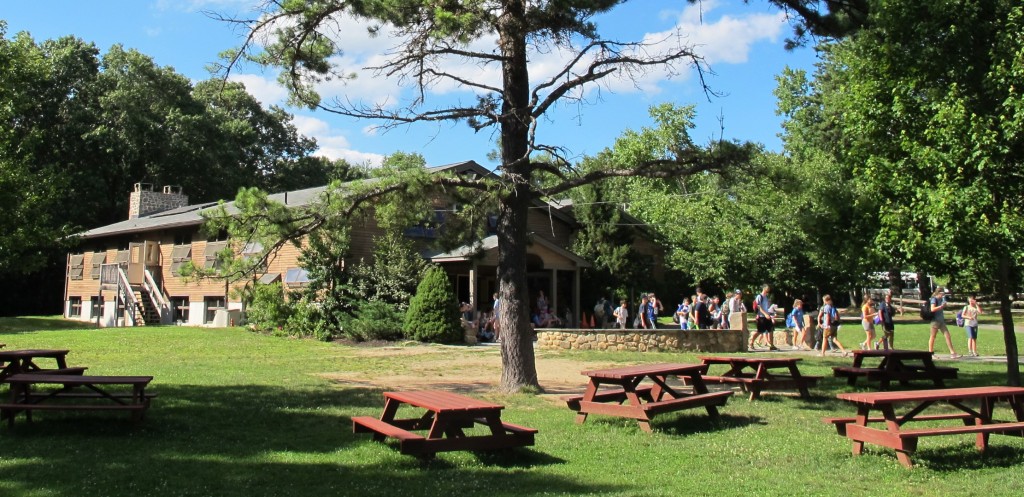Due to the pandemic and financial concerns, the University has closed the W. Alton Jones campus. Photos from uri.edu.
In June, citing financial concerns, the University of Rhode Island announced the closing of its W. Alton Jones (WAJ) nature campus; however, amid public outcry, there have been little answers on its future.
Located in West Greenwich, WAJ sits on approximately 2,300 acres of forest, according to the University’s website. The campus is commonly used for URI’s annual Leadership Institute, nature research and its summer camp.
URI announced to the public that it would be closing its Environmental Education Center, which offered school programs and summer camp, as well as the Whispering Pines Conference Center, which operated as a retreat and conference venue.
In response to the closure of the campus and the cancellation of all its impending summer camps, five-year camp counselor Kathryn Pope created a petition on Change.org advocating to keep the camp open.
“I don’t think URI is super involved with [WAJ], and I think that was part of the reason they thought it was OK to let it go,” Pope said. “They didn’t fully understand what happens there and I think that was one of our strongest points in the [petition]; like ‘hey, we would love to show you what we do here.’”
The petition reached over 5,000 signatures in June, and has approximately 6,300 signatures as of Nov. 3.
According to URI’s Assistant Director for Media Relations Dave Lavallee, on behalf of Vice President for Administration and Finance Abigail Rider, the campus currently remains open for research to students and faculty as necessary.
In a letter from Rider in response to the petition, she said that the University has no intentions of selling the land or permanently closing the entire property.
“Unfortunately, the pressures that the COVID-19 pandemic has put on the University’s finances are unprecedented,” Rider said. “The investments that would be needed to ensure the health and safety of our campers, and guarantee that the camp could operate in the future, led to the difficult decision to close the [Environmental Education Center].”
However, Pope said the information she has received over the months has varied. According to her, on June 10 she received information that the camp and campus was closing forever for environmental education. As the petition she created grew, URI changed their statements on WAJ to reflect that the programs were shut down due to the COVID-19 this summer, but did not address the life and longevity of the campus at all.
Other than the promise not to sell the campus, Pope said that the community has not received any information since the initial cancellations.
“They’re saying they’re not going to sell it, which is awesome, we love to hear that, because the last thing we need is a giant K-Mart on there,” Pope said. “[But] we still have no word on it and still haven’t gotten really anything.”
According to Lavallee, the University is working to reassess WAJ and its future, discussing potential partnerships with local entities to help it be preserved. Lavallee said that URI is talking with the town of West Greenwich where WAJ is located, the Rhode Island Department of Environmental Management and other nonprofits to explore such partnership opportunities. These partnerships will likely allow WAJ to continue its offerings into the future.
“We want to see it return to its vital role in this way,” Lavallee said. “One of the things we’re trying to do is figure out how to do that. We want it to be a robust place. It’s role in environmental education and research are key to our discussions.”
The University is unclear as to when exact answers on the future of WAJ will be available. In the closure of the facilities, URI also redistributed 17 faculty and staff members throughout other parts of the University as to avoid layoffs, and a small maintenance crew remains to focus on WAJ upkeep. Maria DiSano, the interim director of WAJ, retired in August.
The Leadership Institute, a pre-college program for first-year students where they develop leadership skills and teamwork, typically takes place at WAJ. This year, it met via a new, online format, utilizing larger Zoom meetings and smaller breakout rooms to help foster connectivity among students. While typically three days, this year’s Leadership Institute was a semester long.
With the potential absence of the WAJ campus, Coordinator for the Center of Student Leadership Development Alison Jackson Frasier is unsure what the Leadership Institute will look like moving forward.
“We will miss the magic that the [WAJ] campus added to the tradition and legacy of our programs,” she said. “We will need to look for another local, wooded, camp setting, willing to welcome a college population off season. Our hope would be to combine some of the things we learned this year through engaging students for an entire semester of first-year non-academic leadership programming, with our traditional three-day high-impact program.”
Pope hopes that the future of WAJ is reinstated and summer camps resume in 2021.
“I would ask for [URI] to seriously reconsider, to learn about [WAJ], to talk to us; we would love to talk to you,” Pope said. “There are no harsh feelings at all. We care about this place and we just want the best for both URI [and the community], I think it’s a great part of URI, and for the children of Rhode Island. It’s a great space for them.”





